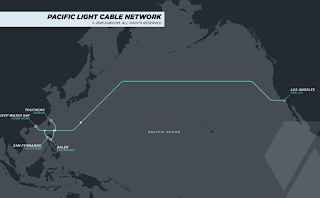Google and Meta Platforms Inc. (formerly Facebook) reached an agreement with Team Telecom (U.S. Departments of Justice, Defense, and Homeland Security) on how to protect data on the Pacific Light Cable Network (PLCN) system, an undersea fiber optic cable system that will connect the United States, Taiwan and the Philippines.
“These agreements enable Google and Meta to take advantage of critical, additional cable capacity while protecting U.S. persons’ privacy and security through terms that reflect the current threat environment,” said Assistant Attorney General Matthew G. Olsen of the Justice Department’s National Security Division, who leads Team Telecom’s work for the Justice Department. “This resolution also demonstrates Team Telecom’s ability to resolve complex cases involving critical infrastructure in a timely matter, thanks to recent reforms of our structure and process.”
Under the National Security Agreements, Google and Meta (and their subsidiaries) have agreed to (among other terms):
- Conduct annual assessments of risk to sensitive data that transits the PLCN cable system, including when the data exits the cable;
 Pursue diversification of interconnection points in Asia, including but not limited to Indonesia, Philippines, Thailand, Singapore and Vietnam; and
Pursue diversification of interconnection points in Asia, including but not limited to Indonesia, Philippines, Thailand, Singapore and Vietnam; and- Restrict access to information and infrastructure by Pacific Light Data Communications Co. Ltd (PLDC), the Hong Kong-based owner of PLCN that withdrew its application for an FCC license.
In June 2020, the committee publicly recommended that the FCC partially deny a previous application for PLCN with respect to PLCN’s proposed connections to Hong Kong and to the portions of the PLCN owned by PLDC. Shortly after that recommendation, the applicants withdrew the original PLCN application. Google’s and Meta’s subsidiaries then filed a new FCC application removing Hong Kong and seeking to operate only the United States, Taiwan and Philippines portions of PLCN.
Google gains partial clearance for Pacific Light subsea cable
Google was granted clearance by the FCC to operate the segment of the Pacific Light Cable Network System connecting the United States to Taiwan for the next six months, pending a final disposition of the license application. The temporary authorization does not authorize any commercial traffic on the subsea cable segments to/from the Philippines or Hong Kong.
The U.S. Department of Justice, along with the Departments of Homeland Security and Defense, advised the FCC that those agencies do not oppose Google's request carry traffic over the cable between the U.S. and Taiwan.
In its application for Special Temporary Authority, Google emphasized “an immediate need to meet internal demand for capacity between the U.S. and Taiwan” and that without the sought temporary authority Google would likely have to seek alternative capacity at “significantly higher prices.”
Under the terms of the Provisional National Security Agreement, Google has agreed to a range of operational requirements, notice obligations, access and security guarantees, as well as auditing and reporting duties, among others. The Provisional National Security Agreement also includes a commitment by Google to “pursue diversification of interconnection points in Asia,” as well as to establish network facilities that deliver traffic “as close as practicable” to its ultimate destination. This term reflects the views of the Executive Branch that a direct cable connection between the United States and Hong Kong would pose an unacceptable risk to the national security and law enforcement interests of the United States.
https://licensing.fcc.gov/cgi-bin/ws.exe/prod/ib/forms/reports/related_filing.hts?f_key=2252704&f_number=SCLSTA2020040200015
Google and Facebook Team Up for Pacific Light Cable Network
The Pacific Light Cable Network (PLCN), which will stretch 12,800 km between Los Angeles and Hong Kong, will have an estimated cable capacity of 120 Tbps. The cable is expected to enter service in the summer of 2018. The project is organized by Pacific Light Data Communication Co. Ltd., a new company based in Hong Kong.
 TE SubCom has been appointed lead contractor. The cable will use TE SubCom’s C+L technology, a major step forward in available cable transmission capacity that effectively doubles the available bandwidth and capacity per fiber pair over a traditional C-band-only designed system.
TE SubCom has been appointed lead contractor. The cable will use TE SubCom’s C+L technology, a major step forward in available cable transmission capacity that effectively doubles the available bandwidth and capacity per fiber pair over a traditional C-band-only designed system.Google noted that it has now taken an ownership stake in six submarine cables: PLCN, Unity, SJC, FASTER, MONET and Tannat.
Facebook backs Bifrost cable from U.S. to Southeast Asia

Facebook and Google collaborate on U.S.-Guam-Singapore cable
Facebook and Google are lead investors in a new subsea cable from Eureka, California to Singapore, with a stop-over in Guam.
The Echo subsea cable will be the first to directly connect the U.S. to Singapore with direct fiber pairs over an express route. The cable is expected to have landings in Indonesia and possibly other locations.
In a blog posting, Google said Echo's unique route to Southeast Asia will avoid the crowded, traditional paths to the north. The cable is expected to be ready for service in 2023.
https://cloud.google.com/blog/products/infrastructure/introducing-the-echo-subsea-cable
https://engineering.fb.com/2021/03/28/connectivity/echo-bifrost/














